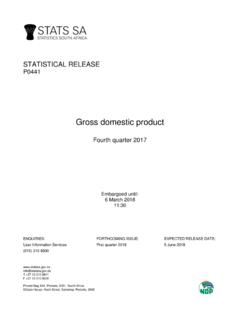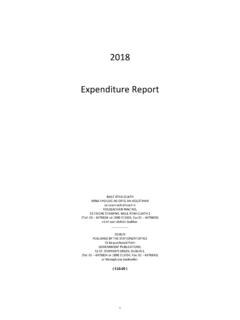Transcription of SCIENCE AND TECHNOLOGY - oecd.org
1 RESEARCH AND DEVELOPMENT expenditure ON R&D RESEARCHERS PATENTS BIOTECHNOLOGY INFORMATION AND COMMUNICATIONS SIZE OF THE ICT SECTOR INVESTMENT IN ICT EXPORTS OF ICT GOODS COMPUTER, INTERNET AND TELECOMMUNICATION SCIENCE AND TECHNOLOGY expenditure ON R&DExpenditure on research and development (R&D) is a keyindicator of countries innovative and development (R&D) comprise creative workundertaken on a systematic basis in order to increase thestock of knowledge (including knowledge of man, cultureand society) and the use of this knowledge to devise newapplications. R&D covers three activities: basic research,applied research, and experimental development. Basicresearch is experimental or theoretical work undertakenprimarily to acquire new knowledge of the underlyingfoundation of phenomena and observable facts, withoutany particular application or use in view. Appliedresearch is also original investigation undertaken inorder to acquire new knowledge; it is, however, directedprimarily towards a specific practical aim or development is systematic work, drawingon existing knowledge gained from research and/orpractical experience, which is directed to producing newmaterials, products or devices, to installing newprocesses, systems and services, or to improvingsubstantially those already produced or main aggregate used for international comparisonsis gross domestic expenditure on R&D (GERD).
2 Thisconsists of the total expenditure (current and capital) onR&D carried out by all resident companies, researchinstitutes, university and government laboratories, etc. Itincludes R&D funded from abroad but excludes domesticfunds for R&D performed outside the domestic is here expressed in constant 2005 dollars(adjusted for purchasing power parity) and as a share ofGDP (R&D intensity).ComparabilityThe R&D data shown here have been compiled accordingto the guidelines of the OECD Frascati Manual. EstimatesOverviewTotal OECD R&D spending in real terms increased in 2010after shrinking by in 2009. This upturn was mainlydue to a strong recovery in the level of R&D performed bythe business sector. Among the G7 countries for which2010 data are available, total R&D expenditure grew (inreal terms) in Germany ( ), Japan ( ), Italy ( )and France ( ), and declined in both Canada and theUnited Kingdom (by around 3%).Among OECD countries, the United States is the mainperformer with 42% of the total OECD GERD in 2009,followed by Japan (15%) and Germany (9%).
3 Since 1999,real R&D expenditure has been growing the fastest inEstonia, Korea, Portugal and Turkey, with average annualgrowth rates around 10%. Outside the OECD area, China saverage annual real growth in R&D spending has beenclose to 20%, making it the world s second largest R&Dperformer and ahead of Japan since 2009, R&D amounted to of GDP for the OECD as awhole. Denmark, Finland, Israel, Japan, Korea andSweden were the only OECD countries whose R&D-to-GDP ratio exceeded 3%.Over the last decade, R&D intensity grew in the EU ( to ), in Japan (from to ) and in theUnited States (from to ). Estonia, Korea,Portugal and Turkey were the fastest growing OECD countries. In the same period (2000-10), R&D intensity inChina almost doubled, increasing from to the resources allocated to R&D are affected by nationalcharacteristics such as the periodicity and coverage ofnational R&D surveys across institutional sectors andindustries (and the inclusion of firms and organisationsof different sizes); and the use of different sampling andestimation methods.
4 R&D typically involves a few largeperformers, hence R&D surveys use various techniquesto maintain up-to-date registers of known performers,while attempting to identify new or for Israel exclude defence. Those for Korea, prior to2007, exclude social sciences and the humanities. For theUnited States, R&D capital expenditures are excludedand depreciation charges of the business enterprises OECD (2012), Main SCIENCE and TECHNOLOGY Indicators,OECD informationAnalytical publications OECD (2012),OECD SCIENCE , TECHNOLOGY and Industry Outlook, OECDP ublishing. OECD (2011),OECD SCIENCE , TECHNOLOGY and Industry Scoreboard,OECD publications OECD (2002),Frascati Manual 2002: Proposed Standard Practice forSurveys on Research and Experimental Development,The Measurement of Scientific and TechnologicalActivities, OECD databases OECD SCIENCE , TECHNOLOGY and R&D StatisticsWebsites OECD SCIENCE , TECHNOLOGY and Industry, OECD Main SCIENCE and TECHNOLOGY Indicators, OECD Research and Development Statistics, OECD Measuring SCIENCE and TECHNOLOGY , OECD R&D and GBAORD Sources and MethodsDatabases, OECD Frascati Manual 2002 (supplementarymaterial)
5 , AND TECHNOLOGY RESEARCH AND DEVELOPMENTOECD Factbook 2013 OECD 2012 - Preliminary VersionGross domestic expenditure on R&DMillion US dollars 2005 constant prices and 6364 9205 2665 5465 9026 0436 8036 9967 4558 0527 8968 1848 417 Belgium5 8106 1256 4976 1656 0186 1496 1716 4406 7507 0817 0907 03219 06321 21521 35221 68722 70923 09023 33623 35622 79622 41621 70821 Republic1 8812 0792 1252 1592 3352 4422 9483 4673 6503 5703 5823 0634 2894 4214 3634 4194 6084 8755 3425 4085 2604 7334 7994 9555 1705 4015 6015 8466 1516 5766 4066 79936 94638 47939 52138 79439 39539 23640 19140 62341 39442 72043 23161 57962 55763 28963 98163 80064 29967 59569 56974 70574 37577 4491 4711 6151 6701 1241 3481 5161 4741 4471 6161 7881 7511 8031 9551 3601 4131 4491 5431 7061 8782 0092 1192 2972 5282 8582 7006 2286 6286 6076 2966 6107 1467 6848 7148 9378 4228 47416 41117 37618 11017 76617 92017 99919 09520 20420 52720 33720 715110 017113 086114 930117 927120 301128 695134 844139 916138 684126 872128 57420 21322 64123 58625 06728 30530 61834 71238 92341 68544 31149 3344 0114 2394 7274 7695 0145 3465 2665 22010 38510 57210 29010 53310 82310 90411 15711 13411 07111 01611 0093 0823 2083 1753 3163 5033 8324 0234 0484 9892 9122 8502 5952 6062 8312 9823 1073 3843 7904 3044 4291 5741 7041 6271 5651 6631 7552 2562 7283 5193 7283 3029 1939 60710 63511 65712 20313 33114 83216 22017 45717 30217 44310 23310 51011 34610 80911 68610 80410 7392 9963 1713 2933 1843 7354 6174 8456 3146 3807 1107 Kingdom29 85631 05631 59432 39932 75932 52434 08135 33137 21937 01836 73135 States282 775302 231306 683300 510307 769310 261325 936339 956355 488371 813365 094208 068215 363219 609221 669223 960229 931242 058251 118262 891262 780267 059690 857712 638715 336730 083743 415779 529818 588857 502888 551873 51230 40134 67342 57049 61859 26471 05583 90296 304111 183140 637161 Federation11
6 41913 24215 60217 30819 13918 36418 12119 68922 23021 89124 18523 9213 2713 6544 0054 1794 domestic expenditure on R&DAs a percentage of GDPS tatlink AND TECHNOLOGY RESEARCH AND DEVELOPMENTOECD Factbook 2013 OECD 2012 - Preliminary VersionRESEARCHERSR esearchers are key actors in the research anddevelopment system. On average, in OECD countries,labour costs account for half of the R&D of total R&D personnel are estimated to are professionals engaged in the conceptionand creation of new knowledge, products, processes,methods and systems, as well as those who are directlyinvolved in the management of projects for suchpurposes. They include researchers working in both civiland military research in government, universities andresearch institutes as well as in the business are part of human resources devoted toR&D. Other categories of R&D personnel are technicians(and equivalent staff) who participate in R&D byperforming scientific and technical tasks, and othersupporting staff (skilled and unskilled craftsmen,secretarial and clerical staff participating in R&Dprojects).
7 The number of researchers is measured in full-timeequivalents ( a person working half-time on R&D iscounted as person-year) and expressed per thousandpeople employed in each country. The number ofresearchers includes staff engaged in R&D during thecourse of one the OECD area, around million persons wereemployed as researchers in 2007. There were about per thousand of employed people, comparedwith per thousand employed in 1995. This indicatorhas steadily increased over the last two Nordic countries (Denmark, Finland, Iceland, Norwayand Sweden) top the table for the numbers of researchersper thousand persons employed, with Finland the highestin the group, and the OECD, recording researchersper thousand persons employed in 2010. Among theremaining OECD countries, rates are highest in Korea( ), Japan ( ) and New Zealand ( in 2009).Conversely, researchers per thousand of employedpeople are low (below ) in Chile and Mexico. Othercountries with low rates, below researchers perthousand of employed people, include Italy, Poland the major non-member countries, growth in thenumber of researchers has been steady in China althoughthe overall level, at per thousand of people employedin 2010, still remains well below the OECD average.
8 Thenumber of researchers per thousand of people employedfor the Russian Federation has been decreasing since1994 but this level, at researchers per thousandemployed in 2010, is similar to that of EU 2007, in the OECD, about million researchers wereengaged in the business sector. It representsapproximately two-thirds of the total although there aredifferences across countries: four out of five researcherswork in the business sector in the United States, aboutthree out of four in Japan and Korea, but less than oneout of two in the EU. Chile, Mexico, Poland, the SlovakRepublic and South Africa have a low intensity ofbusiness researchers (less than one per 1 000 employeesin industry). In these countries, the business sector playsa much smaller role in the national R&D system than thehigher education and government data on researchers have been compiled on the basisof the methodology of the OECD Frascati over time is affected to some extent byimprovements in the coverage of national R&D surveysand by the efforts of countries to improve theinternational comparability of their the United States beginning in 2000, the totalnumbers of researchers are OECD estimates.
9 Data for theUnited States exclude military personnel in thegovernment sector since 1985. For China, from 2009researcher data are collected according to the OECDF rascati Manual definition of OECD (2012), Main SCIENCE and TechnologyIndicators, OECD informationAnalytical publications OECD (2012),OECD SCIENCE , TECHNOLOGY and Industry Outlook 2012,OECD Publishing. OECD (2012),OECD SCIENCE , TECHNOLOGY and Industry Working Papers,OECD Publishing. OECD (2011),OECD SCIENCE , TECHNOLOGY and Industry Scoreboard 2011,OECD Publishing. OECD (2011),Public Research Institutions, Mapping Sector Trends,OECD publications OECD (2002),Frascati Manual 2002: Proposed Standard Practice forSurveys on Research and Experimental Development,The Measurement of Scientific and TechnologicalActivities, OECD databases OECD SCIENCE , TECHNOLOGY and R&D StatisticsWebsites OECD SCIENCE , TECHNOLOGY and Industry, OECD Main SCIENCE and TECHNOLOGY Indicators, OECD Research and Development Statistics, OECD Measuring SCIENCE and TECHNOLOGY , OECD R&D and GBAORD Sources and MethodsDatabases, OECD Frascati Manual 2002 (supplementarymaterial), AND TECHNOLOGY RESEARCH AND DEVELOPMENTOECD Factbook 2013 OECD 2012 - Preliminary VersionResearchersPer thousand employed, full-time thousand employed, full-time equivalentStatlink AND TECHNOLOGY RESEARCH AND DEVELOPMENTOECD Factbook 2013 OECD 2012 - Preliminary VersionPATENTSP atent-based indicators provide a measure of the outputof a country s R&D, its inventions.
10 The methodologyused for counting patents can however influence theresults, as simple counts of patents filed at a nationalpatent office are affected by various kinds of limitations(such as weak international comparability) and highlyheterogeneous patent values. To overcome these limits,the OECD has developed triadic patent families, whichare designed to capture all important inventions and tobe internationally patent family is defined as a set of patents registeredin various countries ( patent offices) to protect thesame invention. Triadic patent families are a set ofpatents filed at three of these major patent offices: theEuropean Patent Office (EPO), the Japan Patent Office(JPO) and the United States Patent and Trademark Office(USPTO).Triadic patent family counts are attributed to the countryof residence of the inventor and to the date when thepatent was first patent families are expressed as numbers and permillion concept of triadic patent families has beendeveloped in order to improve the internationalcomparability and quality of patent-based , only patents registered in the same set ofcountries are included in the family: home advantageand influence of geographical location are thereforeeliminated.














